The figure of Eichmann and Hannah Arendt's faculty of thinking
DOI:
https://doi.org/10.18012/arf.v8i3.60727Keywords:
banality, holocaust, judgment, evilAbstract
Resumo: In her work Eichmann in Jerusalem: a report on the banality of evil, Hannah Arendt (1999) analyzes the trial of Adolf Eichmann – a former Nazi regime official responsible for the deportation of European Jews during the Holocaust, who, in turn, became an expert on the matter. Jewish. During her trial, the author highlights her inability to escape bureaucratic clichés and her conspicuous superficiality in conventional and standardized conduct. Faced with this figure, Arendt is amazed (thaumazein) with the absence of thought in him: the lack of stopping to think. This astonishment led Arendt to question whether the absence of thought was one of the conditions capable of leading man to do evil. From this perspective, this work seeks to analyze the conflicting relationship between the evil that becomes banal, expressed in the figure of Eichmann, and the human faculty of thinking, in order to avoid catastrophes.
Downloads
References
Referências
ABRANCHES, Antônio. Introdução – Uma herança sem testamento. In: ARENDT, Hannah. A Dignidade da Política. Tradução Helena Martins Frida Coelho, Antônio Abranches, César Almeida, Cláudia Drucker e Fernando Rodrigues. Rio de Janeiro: Relume-Dumará, 1993. p. 7-14.
ARENDT, Hannah. Origens do Totalitarismo. Tradução Roberto Raposo. São Paulo: Companhia das Letras, 1989.
ARENDT, Hannah. A Dignidade da Política. Tradução Helena Martins Frida Coelho, Antônio Abranches, César Almeida, Cláudia Drucker e Fernando Rodrigues. Rio de Janeiro: Relume-Dumará, 1993.
ARENDT, Hannah. The Human Condition. Chicago: University of Chicago Press, 1998.
ARENDT, Hannah. Eichmann em Jerusalém: um relato sobre a banalidade do mal. Tradução José Rubens Siqueira. São Paulo: Companhia das Letras, 1999.
ARENDT, Hannah. A condição humana. Tradução Roberto Raposo. Rio de Janeiro: Forense Universitária, 2007.
ARENDT, Hannah. A Vida do Espírito – O pensar, o querer, o julgar. Tradução Antônio Abranches, César Augusto de Almeida e Helena Martins. Rio de Janeiro: Civilização Brasileira, 2009.
CORREIA, Adriano. Arendt e Kant: banalidade do mal e mal radical. Argumentos, Fortaleza, n. 9, p. 63-78, 2013. Disponível em: <http://repositorio.ufc.br/handle/riufc/23746>. Acesso em: 19 jan. 2021.
HOBSBAWM, Eric. Era dos extremos: o breve século XX: 1914-1991. Tradução Marcos Santarrita. São Paulo: Companhia das Letras, 1995.
KANT, Immanuel. Crítica da razão pura. 4. ed. Petrópolis: Vozes; Bragança Paulista: Editora Universitária São Francisco, 2015.
SCHIO, Sônia Maria. Hannah Arendt: o mal banal e o julgar. Veritas, Porto Alegre, v. 56, n. 1, p. 127-136, 2011. Disponível em: <https://revistaseletronicas.pucrs.br/index.php/veritas/article/view/9297/6407>. Acesso em: 8 jan. 2021.
SOUKI, Nádia. Hannah Arendt e a banalidade do mal. Belo Horizonte: UFMG, 1998.
Additional Files
Published
How to Cite
Issue
Section
License

This work is licensed under a Creative Commons Attribution 4.0 International License.
Journal general policy
1.This journal works under a Creative Commons License aplied to online journals. That icence can be read in the following link: Creative Commons Attribution 4.0 International (CC BY 4.0).
2.Accordingly to this License, a)the journal declares that authors hold the copyright of their articles without restrictions, and they can archieve them as post-print elsewhere. b)the journal allow the author(s) to retain publishing rights without restrictions.
Metadata Policy for information describing items in the repository
1. Anyone may access the metadata free of charge at anytime.
2.The metadata may be re-used in any medium without prior permission, even commercial purposes provided the OAI Identifier or a link to the original metadata record are given, under the terms of a CC BY license refered for the Journal.







































